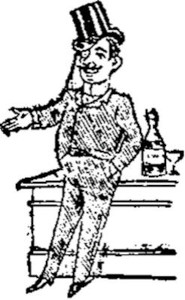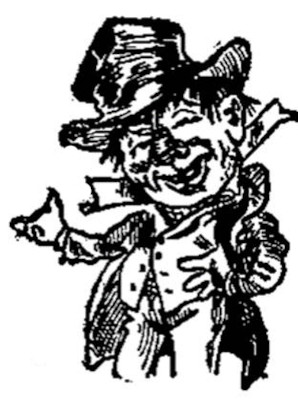This article has been transcribed from a copy of the Cardiff Times in the online collection of scanned Welsh newspapers 1804-1919 in the National Library of Wales, with grateful recognition of the free access accorded to all readers.
Explanatory Notes
'familiar as a household word in the mouths of music-hall patrons' is a glance at the king's speech before Agincourt in Henry V IV.iii.52, which was very widely known because Charles Dickens used 'Household Words' as the title of one of his periodicals.
A ‘codder’ is one who ‘cods’, that is hoaxes, or takes a ‘rise’ out of someone (often used in a theatrical context), and a ‘juggins’ is a person who is easily victimised.
Miss Bessie Bonehill: (17 February 1855–21 August 1902) was an English vaudeville singer, comic entertainer and male impersonator. Wilson and Robertson have not been identified.
The meaning of the word 'ring' in the following sentence has not been traced: 'His rings for the most part are meaningless nonsense, and when they are not[,] they are disgusting trash ...' —— David Skilton

The 'Electric Comedian,' the 'God of the Idolatry' of Music-Hall Patrons
HAVE no explanation to offer as to my referring to music-hall ‘artistes,’ sir, beyond the fact that they so describe themselves – and of course they ought to know what they themselves are. It may be, sir, that you imagine that by treating of such a class of persons I am not appealing to your particular class of readers – you may say, in fact, that but few of your readers know anything whatever of music-hall ‘artistes’ (that phrase again), but in answer to this I should, firstly, allege that such a want of knowledge ought to be repaired so far as an acquaintance upon paper goes; and I should most certainly allege that there is any amount of distinctive character (likely to afford instruction and amusement to the student of human nature) to be found among the shining lights of the gilded ‘ ’aIls of 'armony.’ Besides, there are very few people who do not make acquaintance with ‘variety’ performers through the medium of pantomimes and Saturday night entertainments, though I am free to admit that the music-hall man does, when so introduced, dilute the flavour of his funniosity and render it less sultry, whilst at the same time his metallic-haired (and voiced) sister somewhat lengthens her skirts and moderates the number of her allusions to ‘Chawley,’ [Charley] who was a ‘dye-sy’ [daisy] and a duck. Doubtless a vigilant stage manager gives her to understand that the details of her courtship with ‘her young man’ are rather offensive than interesting, so, in pantomime, she contents herself with showing as much of herself as ever she can short of appearing in the garb of nature, murdering the author's lines and dancing in a disc of moonlight, which obediently follows her as she trips.

The Gentleman who Wastes his Substance on Music-Hall Notabilities
Were I to state what is the really distinctive characteristic of the music-hall performer, I should say that it was unlimited, illimitable, unparalleled, stupendous self-confidence. ‘I am Bangs, I am, the gent as sings “Bet a Bit on Me” – what more do you want?’ or ‘Oi am wan of the Charming Sisters Legpegs, what mide such a 'it with the dooet [“]Go an fry yer Fice,” and ther yer are,’ is about the thing you must expect should it be your lot to be introduced to either of the persons indicated, and they are samples of all the lot. Most likely this unlimited confidence in themselves and their own superabundant talents everywhere perceivable amongst music hall people arises from their doing, for the most part, ‘single-handed shows,’ where they are entirely thrown upon their individual resources in keeping an audience together, or it may be that the openly-expressed admiration of the dissipated tradesmen, fast clerks, second-rate betting men, and hangers on in general who go to make up such part of the audience as they usually mix with ‘after the show’ brings about the undeniable result I have named. Anyhow, the music-hall man or woman is, according to himself or herself, ‘fly’ to all your ‘games’ (usually pronounced ‘gymes’), and can ‘take you a ta-ta all over the shop. Place aux dames. [Make way for the ladies.] Let us talk of the music-hall young woman first. She is almost invariably densely ignorant of all but her ‘business;’ she learns her songs like a parrot, and knows nothing whatever of music (in fact, she nearly drives the unhappy pianist whom she gets to play her new songs over and over again to madness by her dense stupidity); she is most often eaten up with conceit, and in quite ninety-nine cases out of a hundred she has not one grain or iota of talent, but relies exclusively upon double-meaning ‘patter’ and an attractive person. She is not alone mannish in her boldness; she goes beyond that; she can slangurang the biggest ‘codder’ of the male company she keeps. She is not at all proud. After her evening's business is over she invariably betakes herself to the portion of the bar set aside for the ‘artistes’ and their friends, and the aforesaid dissipated tradesmen, sporting publicans, etc. – who have wives and big families at home – enjoy the inestimable privilege of providing her with refreshments. She, of course, does not take the trouble to wash off her make-up, and were you (as I as song writer have had to do hundreds of times, sir – l am not blushing; Mrs S. knows all about it) to call on her by noon next day you would find that the make-up had never been washed off, but had been agreeably supplemented by a considerable amount of grime. You would find a frowsy young woman in dirty lodgings and a dirty though tawdry dressing gown, mending an In old pair of tights, reading a penny number, endeavouring to spell out a MS. song, or telling her own fortune with a dirty pack of cards. But she is not abashed; for will she not at night bloom forth as the ‘Dashing, mashing [flirtatious] Marie?’ She is, in nine cases out of ten, a young woman with a history (and a very questionable one, too), and began her ‘artistic’ life by singing in the ‘concert room’ of a public-bouse. She even learns your Christian name, and does not hesitate to use it, this little distinction being especially gratifying inasmuch as you share the privilege with the hangers-on of the music-hall where she is engaged, including the sporting potboy of the establishment. Bless your life, she loves to make herself agreeable to everybody, and cherishes no foolish class distinctions, however elevated her position may be. She winks at the band, call[s] the conductor ‘Johnny’ in a confidential manner, addresses the curtain-winder-up cum stage manager as ‘Old man,’ and is generally most affable with everyone. As a general rule the dressing room she has assigned to her at music-balls she visits is not conducive to maiden modesty, but, bless you, she is so safe in her own innocence that the fact that a mere bit of lath separates her from the ‘Mammoth Comique’ or the ‘Two Boneless Bounders’ does not prevent her from indulging in playful repartee through the intervening barrier. She is a young woman who is almost invariably beyond the realm of conventionality, and when she places her affections (or stakes her self interest) on a male being who owes previously contracted obligations to another woman, she does not let a trifle of that sort stand in her way. If she happens to be a married woman, and to make a brilliant £30 a week sort of a hit, she generally pensions off her husband and goes her own way in peace. If this fact be doubted I am prepared to name straight away about a dozen ‘star comediennes’ of the music-hall constellation who do this to-day.

The Music-Hall Man's Idea of Comedy – Reddening His Nose
Whilst her fancy in the way of professional names runs to ‘Maudie’ and ‘Eva’ and [‘]Tricksy,’ allied to such aristocratic appellations as that of ‘Montgomery,’ ‘Trevelyan,’ or ‘Beaufort’ (her only connection with the aristocracy otherwise generally consists in her occasionally ‘flashing’ [showing off] with her on tour a dissipated and addlebrained young man of family), her brother of the boards, with an altogether fetching idea of placing himself on easy terms with the blatant cads who patronise him, and yell ‘Hencoor’ when he vocally informs them that he's ‘Been on the blooming Jamboree, and isn't a Juggins [fool] when hout on the spree;’ her brother, I say, likes to call himself by some short and sweet name as ‘Billee Bash,’ ‘Harry Owler’ or ‘Tom Trash,’ which can become familiar as a household word in the mouths of music-hall patrons. He ‘don't care for your big toffs;’ ‘thinks nothink o' any o' yer hupper crust merchants,’ and he is, if such a thing be possible, even more conceited than his sister ‘artiste.’ If you import him into a pantomime he is, when once the reserve begotten of his utter ignorance has worn off, a most disagreeable and offensive person to deal with so far as the actors of the regular stage are concerned, and he keenly resents any interference with his ‘loine o' bizness’ from the stage manager. He is very fond of sporting eccentric garments of the loud pattern that almost seems to shout, and his jewellery is of a pattern that I defy you to find anywhere else; indeed, it is one of the wonders of many a student of human nature where trinkets so obtrusive and yet so ridiculously inartistic can be procured. He is lamentably ignorant about everything save his own particular class of work, but yet he revels in political allusions of stereotyped class, inasmuch as they get him a few ‘hands’ in the way of applause. He is nearly always au fait, though, with the latest racing news, and when, after drawing a salary in gross disproportion to his deserts, he files his petition [for bankruptcy] , he usually ascribes his losses to betting, for he is not quite so ‘fly,’ after all, as some of his friends on the turf, to whom he likes to make particular allusion on the stage, whether the opportunity does or does not serve. His rings for the most part are meaningless nonsense, and when they are not they are disgusting trash, and his knowledge of music is equal to that of his sister of the boards. A good strong voice, an unlimited ‘cheek,’ the flash jewellery aforesaid, and an assertive manner do wonders for him. It may be said that in the matter of his songs (when he is a ‘vocalist’) he does but suit the taste of his audience, but as an answer to this I would say that the few people on the stage in his line who discard flagrant dirt ‘go’ amazingly with the public; for an example I would give Miss Bessie Bonehill and Wilson and Robinson. He keeps up the supply of filth, and creates the demand for it with his public. Take the chorus of almost any popular music-hall song of the day, and I warrant me that you will find some prurient suggestion in it, or, if it is not of nasty sug[g]estiveness, it is of the twaddling silly order such as that idiotic and sickly dirge, ‘I'm in the Now Know], you Now [Know]’ (I have adopted the pronunciation of the music-hall lady who warbles it). We expect the music-hall ‘comic’ (heaven save us, ‘comic’) or ‘comique,’ as he likes to call it, to be a cad, but we do not ask that he shall be a pig. He supplies the latter attribute of his own accord.
Links to Related Material
Last modified 13 May 2022